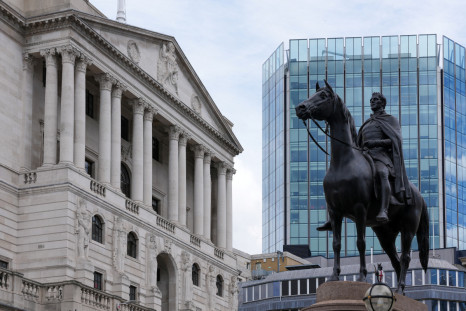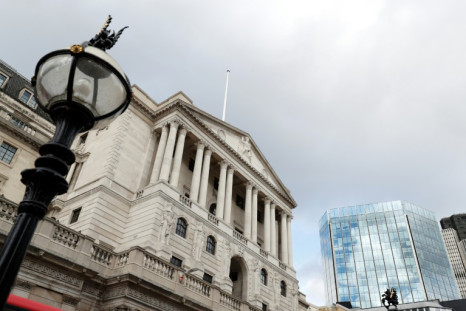Home
> Bank of England
Bank of England
Bank of England says insurers more likely to fail if capital cut rule goes ahead
Britain's proposals to loosen capital rules for insurers will increase the chances of an insurance company failing by 20% in a given year, the Bank of England has told lawmakers, reiterating its caution over the government's plan.
Another BoE rate rise isn't inevitable, Bailey says
Bank of England Governor Andrew Bailey said on Wednesday it was possible the central bank had already come to the end of its rate-rising cycle, leading financial markets question whether a rate rise this month is as clear-cut as they thought.
UK economy in crisis, as the Chancellor urges missing workforce to return
Latest figures from the ONS reveal zero GDP growth in Q4 2022. A labour shortage is part of the problem, with the Chancellor urging people to return to work.
Slowdown in UK inflation eases pressure on Bank of England
British inflation fell by more than expected in January and there were signs of cooling price pressure in parts of the economy watched closely by the Bank of England, adding to signs that further hefty interest rate hikes are unlikely.
Bank of England to lift bank rate 25 basis points to 4.25% in March, then pause: Reuters poll
The Bank of England will make its final increase to borrowing costs in the current cycle next month to combat double-digit inflation, according to a Reuters poll which showed the British economy is almost certainly entering a recession.
Britain sets out legislation to regulate buy-now-pay-later credit
Britain on Tuesday will set out draft legislation to regulate "buy now pay later" credit, saying the sector posed potential harm to consumers without thorough affordability checks.
Bank of England officials split over future path for rates
Bank of England policymakers disagreed on Thursday about where interest rates need to go to tame inflation, with Governor Andrew Bailey stressing the uncertainty of the outlook, a week after the BoE suggested its run of rate hikes might be peaking.
Latest interest rate increase is 'bad news' for business owners, claims finance expert
A leading business finance expert has claimed that the latest increase in interest rates is 'bad news' for many businesses.
What is Bank of England watching as it considers peak in rates?
The Bank of England has signalled the tide is turning in its battle against high inflation after a series of interest rate hikes - but it has also said it is too soon declare victory.
Bank of England hikes interest rate tenth time in row
The Bank of England on Thursday hiked its interest rate for a tenth time in a row as global authorities race to combat sky-high inflation.
BoE set to lift rates to 14-year high, might hint at next moves
The Bank of England is poised to raise interest rates for the 10th time in a row on Thursday to keep up its fight against rampant inflation, but it might also drop a hint about when the steep climb in borrowing costs will end.
Drop in business activity flags UK recession risk - flash PMI
British private-sector economic activity fell at its fastest rate in two years in January, a survey showed on Tuesday, as businesses blamed higher Bank of England interest rates, strikes and weak consumer demand for the slowdown.
Bank of England to lift rates to 4% on Feb 2, finish at 4.25% in March - Reuters poll
The Bank of England will lift the Bank Rate by 50 basis points on Feb.
What is the Bank of England looking at before rate decision?
The Bank of England must decide next week how much higher it will raise borrowing costs as it tries to bear down on Britain's double-digit inflation rate without adding too much stress to an economy already close to recession.
BoE sceptical over digital pound as euro zone backs work on digital euro
Bank of England Governor Andrew Bailey questioned the need for a digital pound on Monday just as euro zone finance ministers backed further preparatory work on a digital euro.
BoE's Pill sees risk of persistent inflation, even if gas prices fall
Bank of England Chief Economist Huw Pill said on Monday that Britain is at risk of persistent inflationary pressure from a tight labour market, even if natural gas prices stabilise or fall, implying further rate rises may be needed.
Bank of England raises rates again and sees more hikes to fight inflation
The Bank of England raised its key interest rate by half a percentage point on Thursday and indicated that more hikes were likely, despite a looming recession, as it tries to bring down inflation that hit a 41-year high in October.
Bank of England readies another rate hike even as recession hits
A ninth interest rate hike in a row by the Bank of England looks to be a foregone conclusion on Thursday and investors will be looking for clues on how many more will be needed with the economy sliding into recession but inflation still above 10%.
BoE to stress test non-banks for first time after pensions turmoil
Investment funds and other non-bank financial institutions face their first 'stress test' next year to apply lessons from the near-meltdown in Britain's pension fund sector, the Bank of England (BoE) said on Tuesday.
Bank of England warns of rising pressure on British households and businesses
The Bank of England warned on Tuesday about "significant pressure" on households and businesses due to higher inflation and borrowing costs, but said they were more resilient than before the global financial crisis.
BoE to test 'shadow banking' after markets chaos
The Bank of England will test so-called shadow banking institutions such as pension funds, that played a key role in recent UK bond market chaos, it said Tuesday.
Bank of England to add 50 bps to Bank Rate on Dec. 15; peak at 4.25% in Q2: Reuters Poll
The Bank of England will add another 50 basis points to Bank Rate next week and take borrowing costs to 3.50%, despite the economy falling into recession, as it battles inflation running at more than five times its target, a Reuters poll found.
Bank of England set to raise rates to 3.5% after inflation hits 41-year high
The Bank of England looks set to raise interest rates to 3.5% or more next week, but policymakers appear increasingly split on how much tightening is needed to tame double-digit inflation as the economy heads into recession.
Bank of England to raise Bank Rate by 50 bps in Dec, peak at 4.25% in Q1: Reuters poll
The Bank of England will press on with interest rate rises to battle inflation even though Britain is heading into a long albeit shallow recession, with consumers facing an extended cost of living crisis, a Reuters poll of economists found.
UK hiring falls as political upheaval adds to employers' worries
British employers cut their hiring of permanent staff via recruitment firms for the first time in nearly two years in October as the country's political upheaval added to concerns about the economy, a survey showed on Thursday.
Rising interest rates: Why the Bank of England has increased rates again and what to expect next
Higher interest rates can also boost a currency because investors are encouraged to bring money into the country to benefit from higher returns.
More transparency in 'non banks' a first step after gilts turmoil, says Bank of England
Improving transparency of 'non-banks' such as pension funds is a first step in applying lessons from turmoil in Britain's government bond market, Bank of England executive director Sarah Breeden said on Monday.
Bank of England raises rates by most since 1989 even as long recession looms
The Bank of England raised interest rates by the most since 1989 on Thursday but it also warned that Britain faced a long recession and told investors borrowing costs were likely to go up by less than they expect.
Bank of England set for biggest rate hike in 33 years
The move would mirror aggressive rate-tightening by central banks worldwide as economies battle the highest prices in decades.
Explainer: Why is the Bank of England selling government bonds?
The Bank of England will pass a major milestone on Tuesday when it holds a first auction to sell some of the 875 billion pounds ($1.01 trillion) of government bonds it bought during successive quantitative easing (QE) programmes from 2009-2021.






























